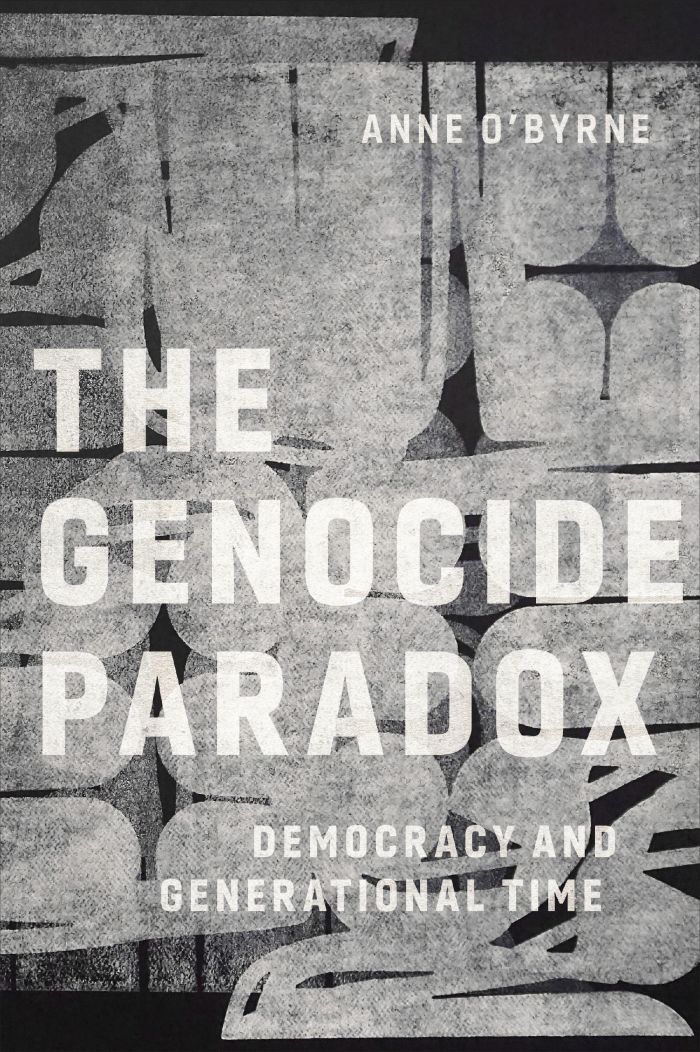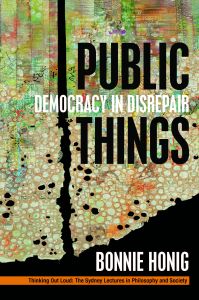The Genocide Paradox
Democracy and Generational Time

This book can be opened with

We regard genocidal violence as worse than other sorts of violence—perhaps the worst there is. But what does this say about what we value about the genos on which nations are said to be founded? This is an urgent question for democracies. We value the mode of being in time that anchors us in the past and in the future, that is, among those who have been and those who might yet be. If the genos is a group constituted by this generational time, the demos was invented as the anti-genos, with no criterion of inheritance and instead only occurring according to the interruption of revolutionary time. Insofar as the demos persists, we experience it as a sort of genos, for example, the democratic nation state. As a result, democracies are caught is a bind, disavowing genos-thinking while cherishing the temporal forms of genos-life; they abhor genocidal violence but perpetuate and disguise it. This is the genocide paradox.
O’Byrne traces the problem through our commitment to existential categories from Aristotle to the life taxonomies of Linneaus and Darwin, through anthropologies of kinship that tether us to the social world, the shortfalls of ethical theory, into the history of democratic theory and the defensive tactics used by real existing democracies when it came to defining genocide for the U.N. Genocide Convention. She argues that, although models of democracy all make room for contestation, they fail to grasp its generational structure or acknowledge the generational content of our lives. They cultivate ignorance of the contingency and precarity of the relations that create and sustain us. The danger of doing so is immense. It leaves us unprepared for confronting democracy’s deficits and its struggle to entertain multiple temporalities. In addition, it leaves us unprepared for understanding the relation between demos and violence, and the ability of good enough citizens to tolerate the slow-burning destruction of marginalized peoples. What will it take to envision an anti-genocidal democracy?
The Genocide Paradox is perceptive and powerfully suggestive. Bringing together democratic politics, time, and genocide, it illuminates troubling historical events with philosophical insights about the human condition, specifically the struggle to reconcile ourselves to a world of becoming when dependence on the past and uncertainty about the future are experienced as existential threats. A humane, thoughtful, creative work.—Jennifer Culbert, Johns Hopkins University
O’Byrne’s book makes a significant contribution to our understanding of a number of urgent topics: democratic theory, genocide, the problem of violence, generational justice, and race and racism in relation to democracy. The book shows how each term contributes to an antigenocidal democracy that nevertheless carries the risk of falling into genocidal violence. O’Byrne’s scholarship is meticulous, and her vast and transdisciplinary engagement with this difficult topic is nothing less than astounding.—Peg Birmingham, DePaul University
The Genocide Paradox is wide-ranging despite its brevity, written with verve and even urgency. It clarifies key assumptions smuggled into the genocide concept, and why they—and Lemkin’s word itself—resonate more in today’s atomized, marooned cultures than perhaps ever before.—H-Net Reviews
Introduction: Democracy and Genos | 1
Generational Being, 10 • Genocidal Violence, 18 • Ontology
and Judgment—On Method, 23 • A Note on Genos, 31
1 Genos | 33
Introduction, 33 • The Tree of Porphyry: The Pleasure of
Order, 36 • Linnaeus: The Sane Systematizer, 40 • Darwin:
Heredity and the Temporal Order, 48 • The Unstable Clade
and the Naturalization of Generational Being, 57
2 How Much Kin Does a Person Need? | 64
Introduction, 64 • Absolute Belonging: Atavus and
Beyond, 64 • The Life of Blood, 73 • The Evidence
of DNA, 77 • Genealogical Th inking, 81 • Creating Kin, 93 •
Genocide as Aenocide, 98
3 What’s Wrong with Genocide? | 103
Introduction, 103 • Genocide and the End of Ethics, 107 •
Genocide beyond the End of Ethics, 114 • Genocidal Life:
The Case of Sexual Violence, 117 • Ontology and Politics, 119
4 Democracy of Generational Beings | 126
The Democratic Paradox and the Genocide Paradox, 126 •
Genos and Cosmos, 131 • Genos and Demos, 136 •
The Problem of Time for Democracies, 141
Conclusion: The Antigenocidal Democracy | 151
Acknowledgments | 165
Notes | 167
Bibliography | 203
Index | 221




